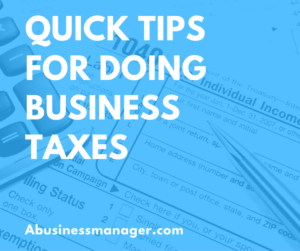Tax time is just around the corner and it is never to early to start getting ready. Our experience has shown that many business owners start focusing on their year-end accounting, bookkeeping and preparations for tax time during the late summer and early fall months. These business owners are making a wise decision to prepare ahead of time. Here are several quick tips for keeping your business taxes on point.
#1 – Get Accounting and Bookkeeping Completed Before Tax Time
In our opinion you should start your accounting and bookkeeping for each tax year on January 1. It is never too early. Business owners that make sure their business accounting and bookkeeping is in good order throughout the year will have several benefits:
- Tax Planning – With an effective accounting and bookkeeping plan in place throughout the year business owners can determine their projected business profit and make adjustments to reduce their taxable business income. If you wait until the year is over you lose the opportunity to take additional steps to reduce your taxable income and your tax bill.
- Eliminate Costly Mistakes – An effective accounting and bookkeeping system will give you an opportunity to correct any mistakes and clarify any questionable transactions before the year is over. Waiting until tax time to prepare your accounting and bookkeeping often results in costly mistakes. With a solid accounting plan in place you will have plenty of time to locate any items needed by your accounting and bookkeeping team. Waiting until tax time may not afford you this opportunity.
- Better Strategic Decisions – Accounting and bookkeeping is not solely for income tax preparation. A good accounting and bookkeeping system will help you make better strategic business decisions. Accurate monthly financial statements can help you determine which business activities are most profitable and it can help you to eliminate excess expenses.
#2 – Avoid Cash Expenses and Income As Much As Possible.
The IRS strongly dislikes cash. If you are paying expenses or receiving income in cash you are asking for trouble. Cash does not leave a paper trail and as a result the IRS can disallow certain cash expenses resulting in additional taxes, interest and penalties. It may be tempting to collect cash income and not report that income but it is a bad idea. A good accounting firm can help you offset that cash income with legitimate business expenses which will reduce or eliminate your tax bill. If you do pay expenses in cash please keep a receipt on file for at least 3 years in the event of an IRS audit. If you receive cash income please report the income and invest in a good accounting and bookkeeping solution to help reduce your tax liability.
#3 – Avoid Excess Meals, Entertainment and Travel Expenses
Meals, Entertainment and Travel expenses are all closely monitored and reviewed by the IRS. When you submit your tax return to the IRS it is run through multiple systems with standardized algorithms that look for abnormalities. An abnormality is often an expense item that is not proportionate to other expense items. It may be tempting to put all of your meals and entertainment on your business books but it is not a good idea. We advise clients to put some but not all of their meals and entertainment expenses on the company books and those expenses should be true business expenses (IE meeting with a customer for dinner or taking a client to a sporting event).
Travel expenses are similar to meals and entertainment. Legitimate business travel expenses should absolutely be put on the business books but you must be prepared to document those expenses and provide proof that they were truly business related.
#4 – Consider Structuring Your Business As An S-Corporation
S-Corporation status is simply a tax designation that is available to corporations and limited liability companies. The benefit of S-Corporation status is the elimination of self-employment tax on the net business income. This results in a net tax savings of approximately 15%. Use caution however because there are several restrictions that must be followed to avoid problems with the IRS and additional taxes. One of those restrictions is taking a salary/paycheck with payroll tax deductions. The IRS has mandated that S-Corporation owners must take a reasonable salary if they are actively involved in the business. If they are not actively involved the expectation would be that the S-Corporation has employees with paychecks and payroll tax deductions. A good accounting firm can help you structure your business as an S-Corporation and make the appropriate recommendations as to payroll structure, timing and amounts (very important).
Our team is very knowledgeable with business accounting, bookkeeping, tax planning and tax preparation. Please contact us if you need any assistance or have any questions.



